System analysts play a crucial role in bridging the gap between business requirements and technological solutions. They ensure that business processes are enhanced through the effective use of technology, making organizations more productive and competitive.
The role requires a mix of technical and soft skills, including a deep understanding of both information technology and business strategy. Skills such as analytical thinking, communication, and problem-solving are as important as knowledge in system design and software development.
Candidates can write these abilities in their resumes, but you can’t verify them without on-the-job System Analyst skill tests.
In this post, we will explore 9 essential System Analyst skills, 11 secondary skills and how to assess them so you can make informed hiring decisions.
Table of contents
9 fundamental System Analyst skills and traits
The best skills for System Analysts include Business Analysis, Technical Proficiency, Data Modeling, Requirements Gathering, Problem-Solving, Process Mapping, Communication Skills, Project Management and Testing and Validation.
Let’s dive into the details by examining the 9 essential skills of a System Analyst.
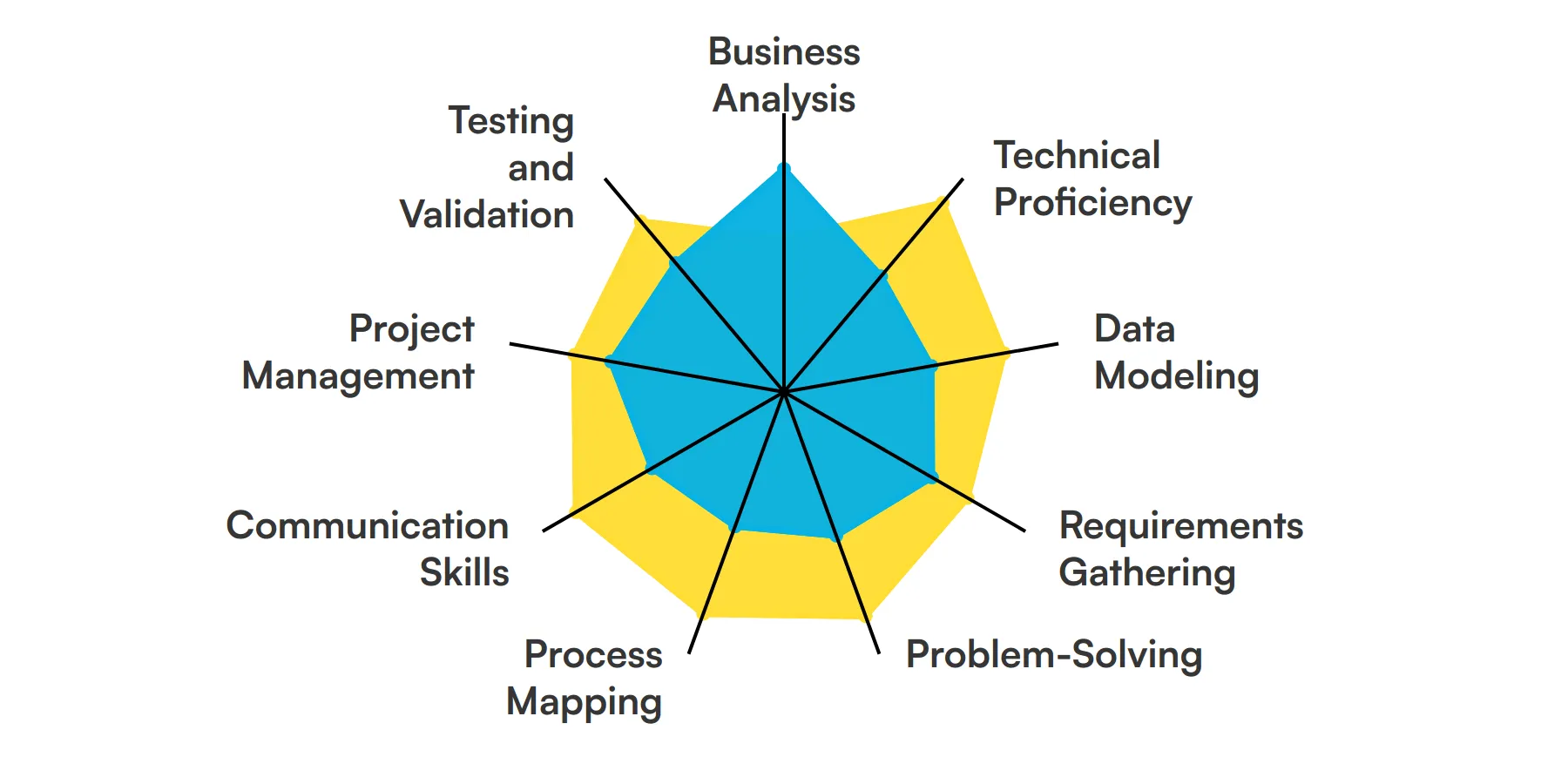
Business Analysis
A system analyst must understand the business processes and requirements of the organization. This skill involves gathering, documenting, and analyzing business needs to ensure that the IT solutions align with the business goals.
For more insights, check out our guide to writing a Business Analyst Job Description.
Technical Proficiency
Having a strong grasp of various technologies, programming languages, and software development methodologies is crucial. This allows the system analyst to effectively communicate with developers and ensure that the technical solutions meet the business requirements.
Data Modeling
Creating data models to represent the data structures and relationships within the system is a key task. This helps in designing databases and ensuring data integrity and consistency across the system.
Check out our guide for a comprehensive list of interview questions.
Requirements Gathering
Collecting and documenting the functional and non-functional requirements from stakeholders is essential. This ensures that the final system meets the needs of the users and performs as expected.
Problem-Solving
A system analyst must be adept at identifying issues within the system and devising effective solutions. This involves troubleshooting, analyzing root causes, and implementing fixes to ensure smooth system operation.
Process Mapping
Documenting and analyzing the current business processes to identify areas for improvement. This helps in designing more efficient workflows and ensuring that the new system enhances productivity.
Communication Skills
Effective communication with stakeholders, developers, and other team members is crucial. This ensures that everyone is on the same page and that the project progresses smoothly.
Project Management
Managing timelines, resources, and deliverables to ensure that the project stays on track. This involves coordinating with various teams and keeping stakeholders informed about the project's progress.
For more insights, check out our guide to writing a Project Manager Job Description.
Testing and Validation
Ensuring that the system meets the specified requirements through rigorous testing. This includes creating test plans, executing tests, and validating that the system performs as expected.
11 secondary System Analyst skills and traits
The best skills for System Analysts include SQL Knowledge, User Interface Design, Networking Basics, Agile Methodologies, Documentation Skills, Security Awareness, API Integration, Version Control, Cloud Computing, Vendor Management and Change Management.
Let’s dive into the details by examining the 11 secondary skills of a System Analyst.
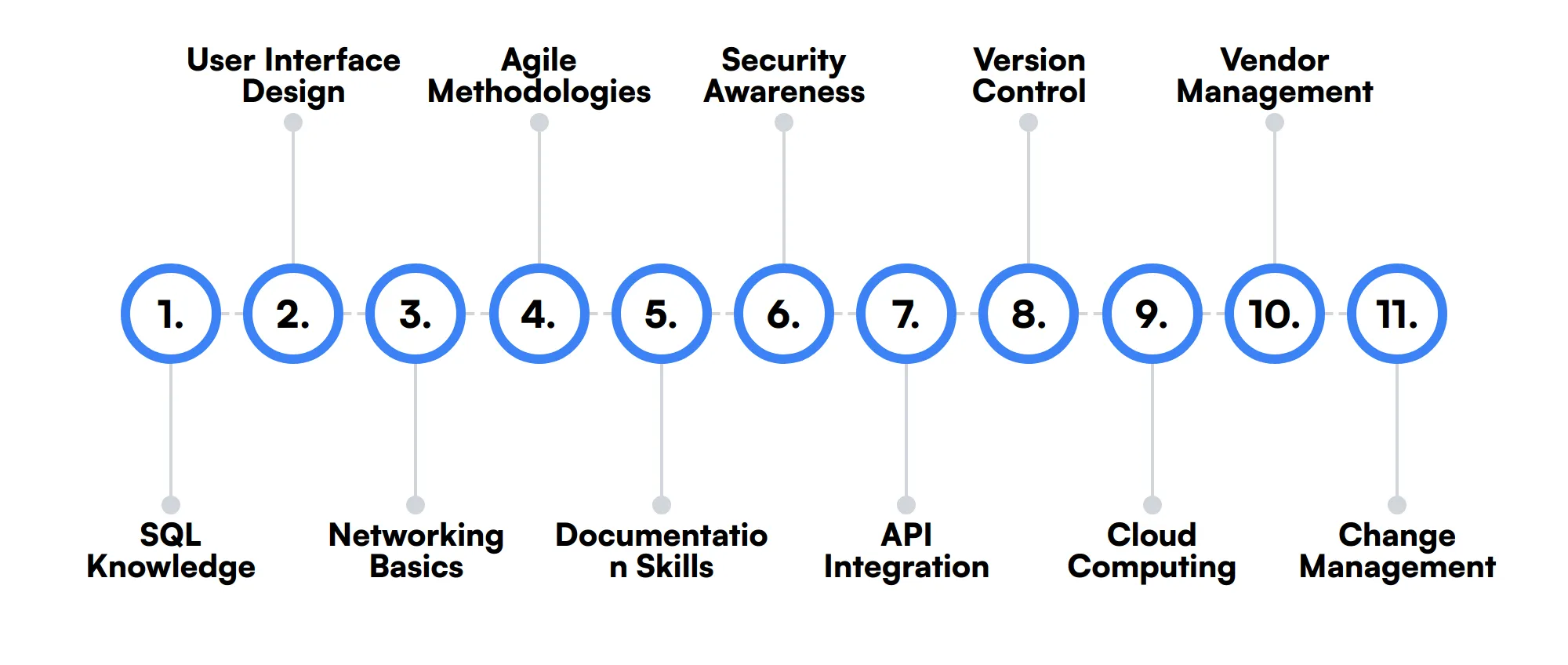
SQL Knowledge
Understanding SQL is beneficial for querying databases and extracting necessary information. This helps in data analysis and troubleshooting database-related issues.
User Interface Design
Having a basic understanding of UI design principles can help in creating user-friendly interfaces. This ensures that the end-users have a positive experience with the system.
Networking Basics
Knowledge of networking concepts can be useful for understanding how different system components interact. This helps in diagnosing network-related issues and ensuring seamless communication between systems.
Agile Methodologies
Familiarity with Agile practices can enhance collaboration and flexibility within the project team. This ensures that the system can adapt to changing requirements and deliver value incrementally.
Documentation Skills
Creating clear and comprehensive documentation for the system is important. This includes user manuals, technical specifications, and process documentation to ensure that the system is well-understood and maintainable.
Security Awareness
Understanding basic security principles helps in designing systems that protect sensitive data. This ensures that the system complies with security standards and mitigates potential risks.
API Integration
Knowledge of APIs and how to integrate them can be useful for connecting different systems. This allows for seamless data exchange and enhances the system's functionality.
Version Control
Using version control systems like Git helps in managing changes to the codebase. This ensures that the development process is organized and that previous versions can be easily accessed if needed.
Cloud Computing
Understanding cloud services and how to leverage them can be beneficial. This allows for scalable and cost-effective solutions that can be easily managed and maintained.
Vendor Management
Coordinating with external vendors and service providers is often necessary. This involves negotiating contracts, managing relationships, and ensuring that the services provided meet the project requirements.
Change Management
Managing changes to the system and ensuring that they are implemented smoothly. This involves planning, communication, and training to ensure that users are prepared for the new system.
How to assess System Analyst skills and traits
Assessing the skills and traits of a System Analyst can be a multifaceted process. It's not just about what they know, but how they apply their knowledge in real-world scenarios. From business analysis to technical proficiency, and from data modeling to communication skills, each aspect plays a significant role in determining their overall capability.
Traditional resumes and interviews might give you a glimpse of their qualifications, but they often fall short in revealing the true depth of a candidate's expertise. This is where skills-based assessments come into play. By leveraging tools like Adaface on-the-job skill tests, you can achieve a 2x improved quality of hires and an 85% reduction in screening time.
When assessing System Analysts, it's important to evaluate their proficiency in key areas such as requirements gathering, problem-solving, process mapping, and project management. These skills are critical for ensuring that they can effectively bridge the gap between business needs and technical solutions. Additionally, their ability to communicate clearly and validate testing processes can make a significant difference in project outcomes.
Let’s look at how to assess System Analyst skills with these 6 talent assessments.
Data Interpretation Assessment Test
Data Interpretation Assessment Test evaluates a candidate's ability to analyze complex data, extract meaningful insights, and structure observations from multiple data sources like tables, charts, and graphs.
The test assesses skills in reading data, drawing inferences, interpreting graphs, analyzing charts, and data visualization.
Successful candidates demonstrate proficiency in understanding and interpreting various data formats, enabling them to make informed decisions based on data analysis.
Technical Aptitude Test
Technical Aptitude Test uses scenario-based multiple-choice questions to evaluate a candidate's general technical aptitude and problem-solving skills.
The test covers programming fundamentals, data structures, algorithm basics, and technical aptitude. It also assesses critical thinking, logical reasoning, and analytical skills.
Candidates are evaluated on their ability to apply technical knowledge to solve complex problems, demonstrating a solid understanding of core technical concepts.
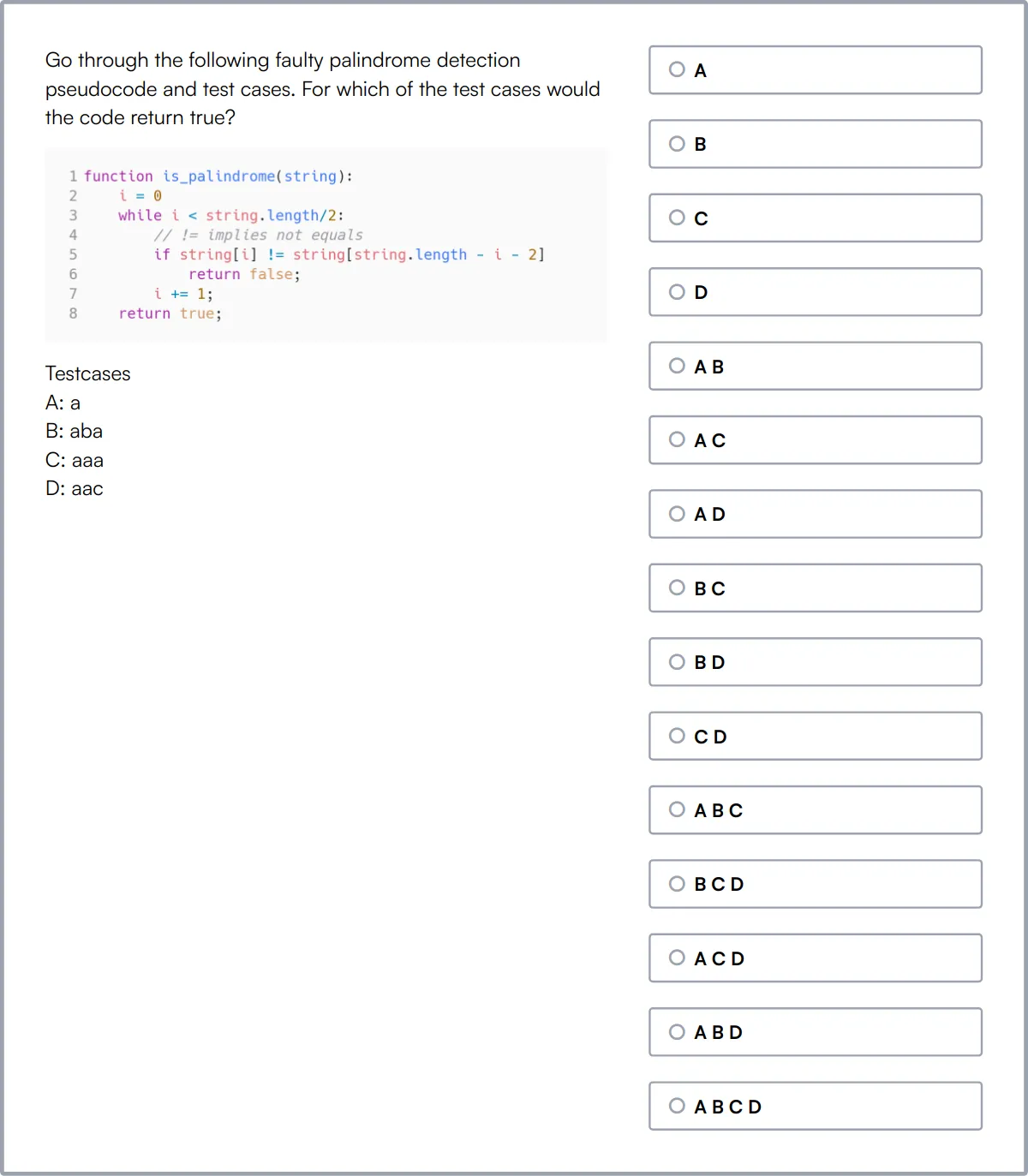
Data Modeling Skills Test
Data Modeling Skills Test evaluates a candidate's knowledge and abilities in database design, SQL, ER diagrams, normalization, and relational schema.
The test assesses skills in data modeling, database design, data integrity, data mapping, and data transformation.
High-scoring candidates show proficiency in creating and managing relational databases, ensuring data integrity, and effectively transforming data to meet business needs.
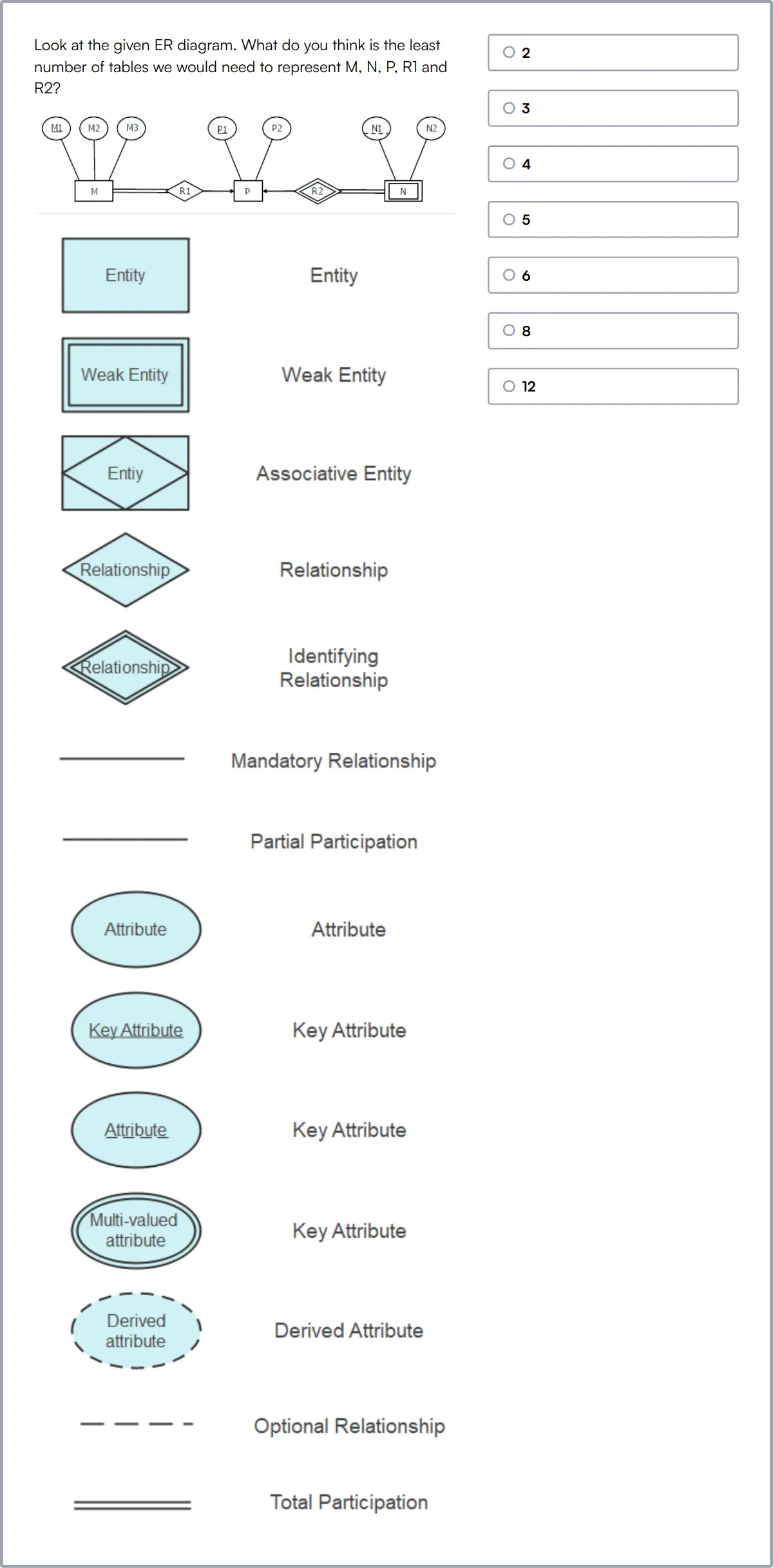
Business Analyst IT Test
Business Analyst IT Test uses scenario-based MCQs to evaluate candidates on their understanding of the role of a business analyst in IT projects.
The test covers requirements gathering, business analysis, process improvement, system design, and project management. It also assesses critical thinking and communication skills.
Candidates are evaluated on their ability to create user stories, use cases, process flows, and wireframes, demonstrating a comprehensive understanding of business analysis in IT.
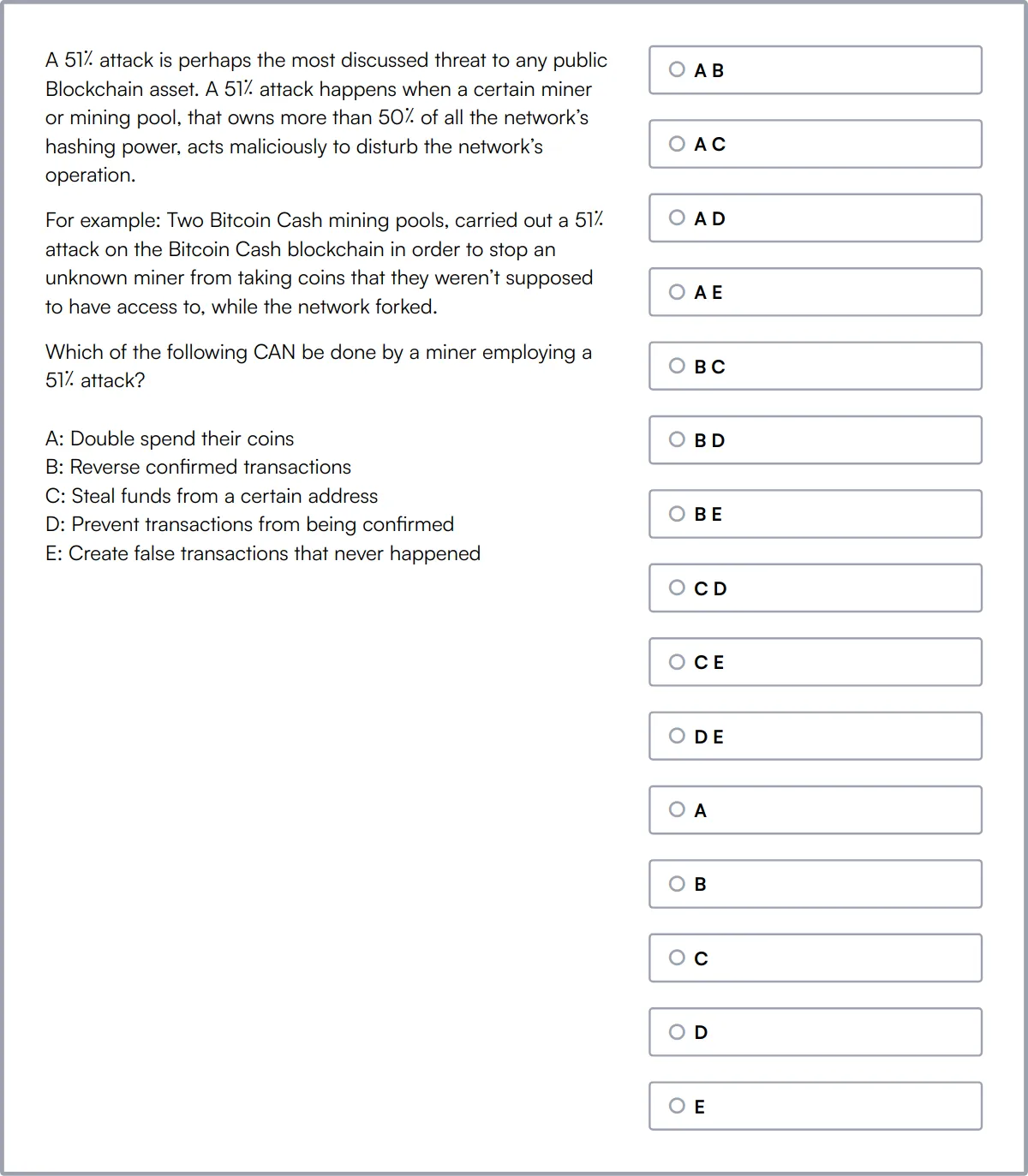
Problem Solving Test
Problem Solving Test evaluates a candidate's ability to understand instructions, analyze data, and respond to complex problems or situations.
The test assesses skills in abstract reasoning, critical thinking, deductive reasoning, inductive reasoning, and pattern matching.
Successful candidates demonstrate strong problem-solving abilities, learning agility, and the capacity to handle complex scenarios effectively.
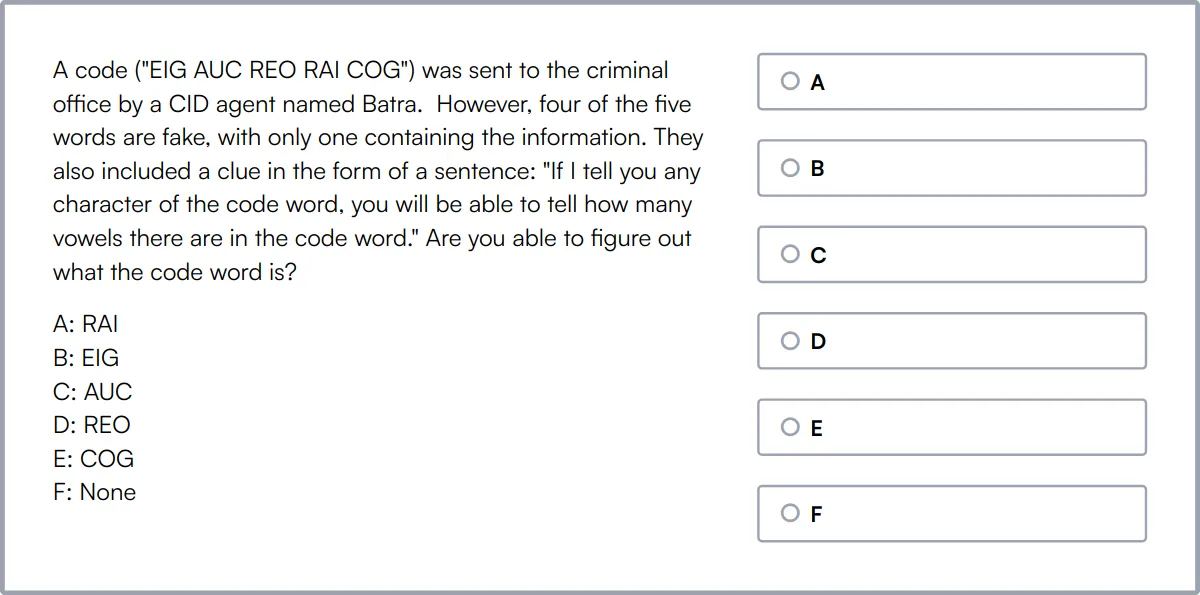
UML Online Test
UML Online Test uses scenario-based multiple-choice questions to evaluate candidates on their understanding of the Unified Modeling Language (UML) and its various diagrams.
The test covers UML fundamentals, use case diagrams, class diagrams, sequence diagrams, and activity diagrams. It also assesses proficiency in modeling software systems using UML.
Candidates are evaluated on their ability to interpret and analyze UML diagrams, design software architectures, and communicate effectively with stakeholders.
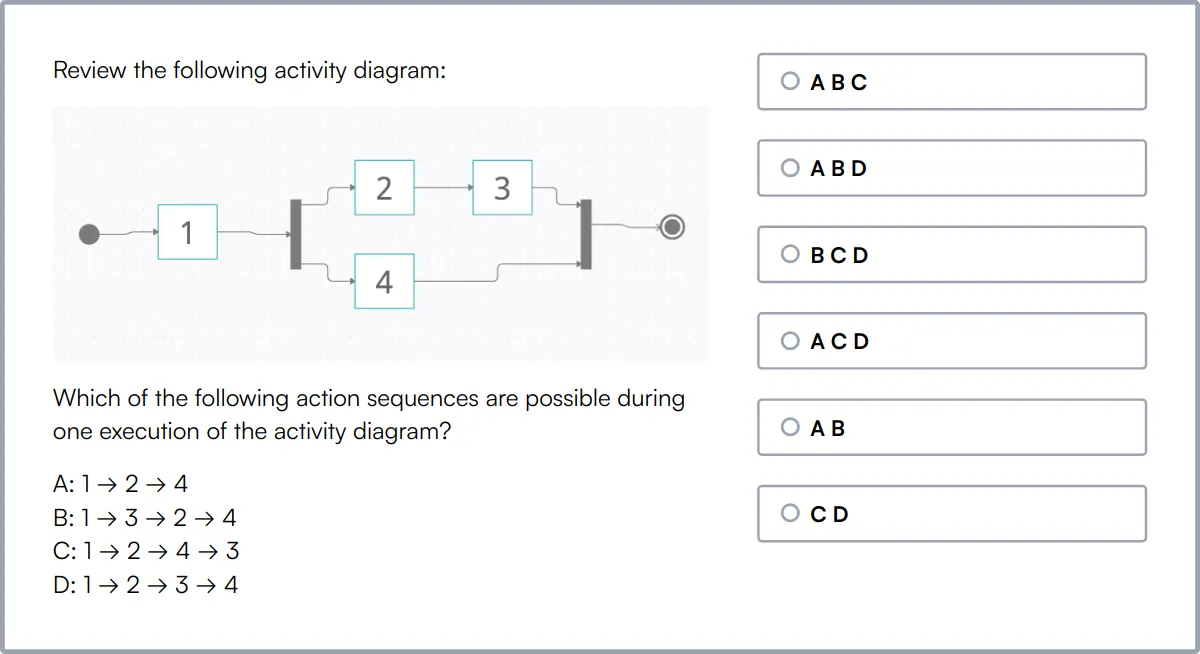
Summary: The 9 key System Analyst skills and how to test for them
| System Analyst skill | How to assess them |
|---|---|
| 1. Business Analysis | Evaluate ability to understand and document business needs. |
| 2. Technical Proficiency | Assess knowledge of relevant technologies and tools. |
| 3. Data Modeling | Check skills in creating data models and schemas. |
| 4. Requirements Gathering | Gauge effectiveness in collecting and documenting requirements. |
| 5. Problem-Solving | Determine capability to identify and resolve issues. |
| 6. Process Mapping | Evaluate proficiency in visualizing and documenting processes. |
| 7. Communication Skills | Assess clarity and effectiveness in conveying information. |
| 8. Project Management | Check ability to plan, execute, and manage projects. |
| 9. Testing and Validation | Gauge skills in verifying and validating system functionality. |
System Design Online Test
System Analyst skills FAQs
What are the key skills required for a System Analyst role?
Key skills include Business Analysis, Technical Proficiency, Data Modeling, Requirements Gathering, Problem-Solving, and Communication Skills.
How can recruiters assess a candidate's Business Analysis skills?
Recruiters can assess Business Analysis skills through case studies, scenario-based questions, and reviewing past project documentation.
Why is Technical Proficiency important for a System Analyst?
Technical Proficiency allows System Analysts to understand and work with various technologies, ensuring they can effectively bridge the gap between business needs and technical solutions.
What methods can be used to evaluate a candidate's Problem-Solving abilities?
Problem-Solving abilities can be evaluated through situational questions, problem-solving exercises, and reviewing how candidates have handled past challenges.
How do Communication Skills impact a System Analyst's performance?
Strong Communication Skills enable System Analysts to clearly convey requirements, collaborate with stakeholders, and ensure project alignment.
What is the significance of SQL Knowledge for a System Analyst?
SQL Knowledge is crucial for querying databases, analyzing data, and supporting data-driven decision-making processes.
How can recruiters test a candidate's knowledge of Agile Methodologies?
Recruiters can test Agile Methodologies knowledge through questions about Agile principles, past experiences with Agile projects, and specific Agile practices like Scrum or Kanban.
What role does Cloud Computing play in a System Analyst's responsibilities?
Cloud Computing knowledge helps System Analysts design scalable solutions, manage cloud-based resources, and integrate cloud services into business processes.

40 min skill tests.
No trick questions.
Accurate shortlisting.
We make it easy for you to find the best candidates in your pipeline with a 40 min skills test.
Try for freeRelated posts
Free resources



